Fleurs du Mal Magazine


Or see the index
.jpg)
Wunsch, Indianer zu werden
Franz Kafka (1883-1924)
Wenn man doch ein Indianer wäre, gleich bereit, und auf dem rennenden Pferde, schief in der Luft, immer wieder kurz erzitterte über dem zitternden Boden, bis man die Sporen ließ, denn es gab keine Sporen, bis man die Zügel wegwarf, denn es gab keine Zügel, und kaum das Land vor sich als glatt gemähte Heide sah, schon ohne Pferdehals und Pferdekopf.
.jpg)
Franz Kafka: Betrachtung 1913 – Für M.B.
fleursdumal.nl magazine
More in: Archive K-L, Franz Kafka, Kafka, Franz, Kafka, Franz
.jpg)
Guy de Maupassant
(1850-1893)
Le Mur
Les fenêtres étaient ouvertes. Le salon
Illuminé jetait des lueurs d’incendies,
Et de grandes clartés couraient sur le gazon.
Le parc, là-bas, semblait répondre aux mélodies
De l’orchestre, et faisait une rumeur au loin.
Tout chargé des senteurs des feuilles et du foin,
L’air tiède de la nuit, comme une molle haleine,
S’en venait caresser les épaules, mêlant
Les émanations des bois et de la plaine
À celles de la chair parfumée, et troublant
D’une oscillation la flamme des bougies.
On respirait les fleurs des champs et des cheveux.
Quelquefois, traversant les ombres élargies,
Un souffle froid, tombé du ciel criblé de feux,
Apportait jusqu’à nous comme une odeur d’étoiles.
Les femmes regardaient, assises mollement,
Muettes, l’oeil noyé, de moment en moment
Les rideaux se gonfler ainsi que font des voiles,
Et rêvaient d’un départ à travers ce ciel d’or,
Par ce grand océan d’astres. Une tendresse
Douce les oppressait, comme un besoin plus fort
D’aimer, de dire, avec une voix qui caresse,
Tous ces vagues secrets qu’un coeur peut enfermer.
La musique chantait et semblait parfumée;
La nuit embaumant l’air en paraissait rythmée,
Et l’on croyait entendre au loin les cerfs bramer.
Mais un frisson passa parmi les robes blanches;
Chacun quitta sa place et l’orchestre se tut,
Car derrière un bois noir, sur un coteau pointu,
On voyait s’élever, comme un feu dans les branches,
La lune énorme et rouge à travers les sapins.
Et puis elle surgit au faîte, toute ronde,
Et monta, solitaire, au fond des cieux lointains,
Comme une face pâle errant autour du monde.
Chacun se dispersa par les chemins ombreux
Où, sur le sable blond, ainsi qu’une eau dormante,
La lune clairsemait sa lumière charmante.
La nuit douce rendait les hommes amoureux,
Au fond de leurs regards allumant une flamme.
Et les femmes allaient, graves, le front penché,
Ayant toutes un peu de clair de lune à l’âme.
Les brises charriaient des langueurs de péché.
J’errais, et sans savoir pourquoi, le coeur en fête.
Un petit rire aigu me fit tourner la tête,
Et j’aperçus soudain la dame que j’aimais,
Hélas! d’une façon discrète, car jamais
Elle n’avait cessé d’être à mes voeux rebelle:
« Votre bras, et faisons un tour de parc », dit-elle.
Elle était gaie et folle et se moquait de tout,
Prétendait que la lune avait l’air d’une veuve:
« Le chemin est trop long pour aller jusqu’au bout,
Car j’ai des souliers fins et ma toilette est neuve;
Retournons. » Je lui pris le bras et l’entraînai.
Alors elle courut, vagabonde et fantasque,
Et le vent de sa robe, au hasard promené,
Troublait l’air endormi d’un souffle de bourrasque.
Puis elle s’arrêta, soufflant; et doucement
Nous marchâmes sans bruit tout le long d’une allée.
Des voix basses parlaient dans la nuit, tendrement,
Et, parmi les rumeurs dont l’ombre était peuplée,
On distinguait parfois comme un son de baiser.
Alors elle jetait au ciel une roulade!
Vite tout se taisait. On entendait passer
Une fuite rapide; et quelque amant maussade
Et resté seul pestait contre les indiscrets.
Un rossignol chantait dans un arbre, tout près,
Et dans la plaine, au loin, répondait une caille.
Soudain, blessant les yeux par son reflet brutal,
Se dressa, toute blanche, une haute muraille,
Ainsi que dans un conte un palais de métal.
Elle semblait guetter de loin notre passage.
« La lumière est propice à qui veut rester sage,
Me dit-elle. Les bois sont trop sombres, la nuit.
Asseyons-nous un peu devant ce mur qui luit. »
Elle s’assit, riant de me voir la maudire.
Au fond du ciel, la lune aussi me sembla rire!
Et toutes deux d’accord, je ne sais trop pourquoi,
Paraissaient s’apprêter à se moquer de moi.
Donc, nous étions assis devant le grand mur blême;
Et moi, je n’osais pas lui dire: « Je vous aime! »
Mais comme j’étouffais, je lui pris les deux mains.
Elle eut un pli léger de sa lèvre coquette
Et me laissa venir comme un chasseur qui guette.
Des robes, qui passaient au fond des noirs chemins,
Mettaient parfois dans l’ombre une blancheur douteuse.
La lune nous couvrait de ses rayons pâlis
Et, nous enveloppant de sa clarté laiteuse,
Faisait fondre nos coeurs à sa vue amollis.
Elle glissait très haut, très placide et très lente,
Et pénétrait nos chairs d’une langueur troublante.
J’épiais ma compagne, et je sentais grandir
Dans mon être crispé, dans mes sens, dans mon âme,
Cet étrange tourment où nous jette une femme
Lorsque fermente en nous la fièvre du désir!
Lorsqu’on a, chaque nuit, dans le trouble du rêve,
Le baiser qui consent, le « oui » d’un oeil fermé,
L’adorable inconnu des robes qu’on soulève,
Le corps qui s’abandonne, immobile et pâmé,
Et qu’en réalité la dame ne nous laisse
Que l’espoir de surprendre un moment de faiblesse!
Ma gorge était aride; et des frissons ardents
Me vinrent, qui faisaient s’entrechoquer mes dents,
Une fureur d’esclave en révolte, et la joie
De ma force pouvant saisir, comme une proie,
Cette femme orgueilleuse et calme, dont soudain
Je ferais sangloter le tranquille dédain!
Elle riait, moqueuse, effrontément jolie;
Son haleine faisait une fine vapeur
Dont j’avais soif. Mon coeur bondit; une folie
Me prit. Je la saisis en mes bras. Elle eut peur,
Se leva. J’enlaçai sa taille avec colère,
Et je baisai, ployant sous moi son corps nerveux,
Son oeil, son front, sa bouche humide et ses cheveux!
La lune, triomphant, brillait de gaieté claire.
Déjà je la prenais, impétueux et fort,
Quand je fus repoussé par un suprême effort.
Alors recommença notre lutte éperdue
Près du mur qui semblait une toile tendue.
Or, dans un brusque élan nous étant retournés,
Nous vîmes un spectacle étonnant et comique.
Traçant dans la clarté deux corps désordonnés,
Nos ombres agitaient une étrange mimique,
S’attirant, s’éloignant, s’étreignant tour à tour.
Elles semblaient jouer quelque bouffonnerie,
Avec des gestes fous de pantins en furie,
Esquissant drôlement la charge de l’Amour.
Elles se tortillaient farces ou convulsives,
Se heurtaient de la tête ainsi que des béliers;
Puis, redressant soudain leurs tailles excessives,
Restaient fixes, debout comme deux grands piliers.
Quelquefois, déployant quatre bras gigantesques,
Elles se repoussaient, noires sur le mur blanc,
Et, prises tout à coup de tendresses grotesques,
Paraissaient se pâmer dans un baiser brûlant.
La chose étant très gaie et très inattendue,
Elle se mit à rire. – Et comment se fâcher,
Se débattre et défendre aux lèvres d’approcher
Lorsqu’on rit? Un instant de gravité perdue
Plus qu’un coeur embrasé peut sauver un amant!
Le rossignol chantait dans son arbre. La lune
Du fond du ciel serein recherchait vainement
Nos deux ombres au mur et n’en voyait plus qu’une.

Guy de Maupassant poetry
fleursdumal.nl magazine
More in: Archive M-N, Archive M-N, Guy de Maupassant, Maupassant, Guy de
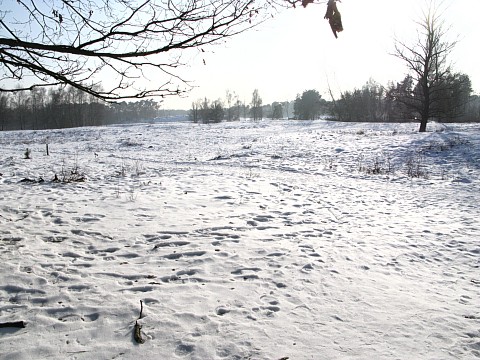
.jpg)
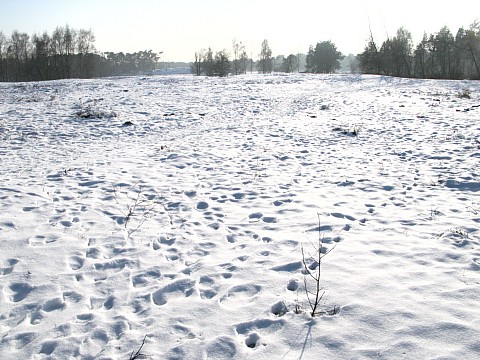
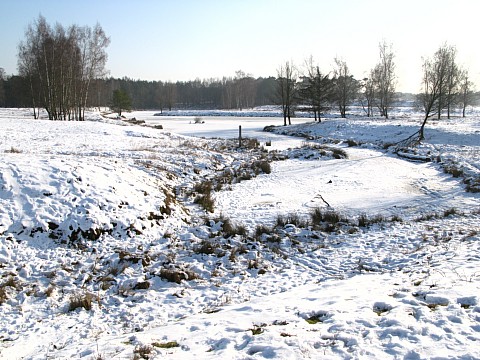
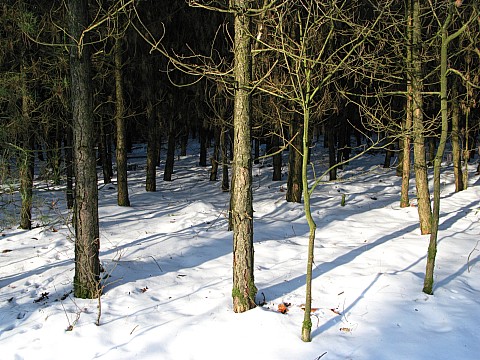
William Butler Yeats
(1865-1939)
Mad As The Mist And Snow
Bolt and bar the shutter,
For the foul winds blow:
Our minds are at their best this night,
And I seem to know
That everything outside us is
Mad as the mist and snow.
Horace there by Homer stands,
Plato stands below,
And here is Tully’s open page.
How many years ago
Were you and I unlettered lads
Mad as the mist and snow?
You ask what makes me sigh, old friend,
What makes me shudder so?
I shudder and I sigh to think
That even Cicero
And many-minded Homer were
Mad as the mist and snow.
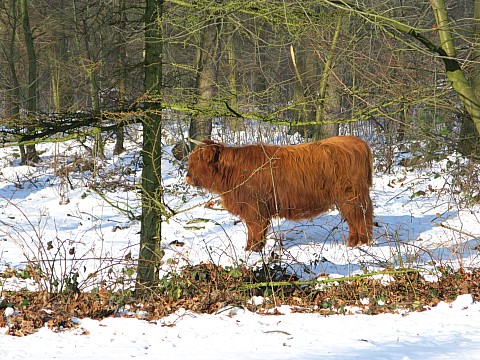

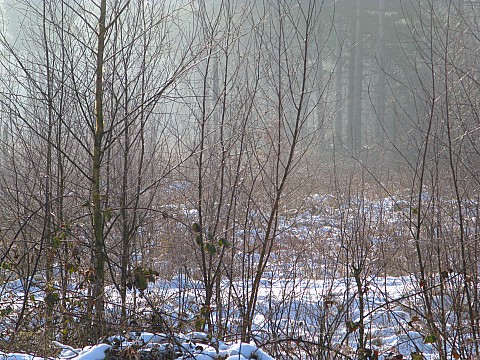
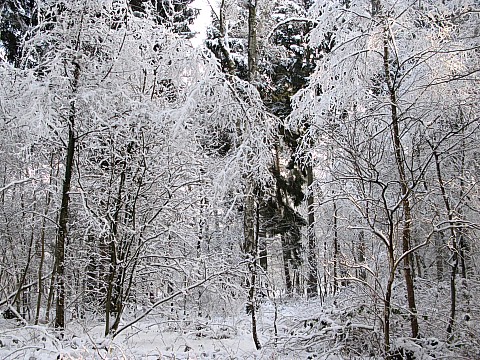


Winter (2) 2010
Photos: Ton van Kempen
Poem: W.B. Yeats
fleursdumal.nl magazine
More in: 4SEASONS#Winter, Dutch Landscapes, Ton van Kempen Photos, Yeats, William Butler
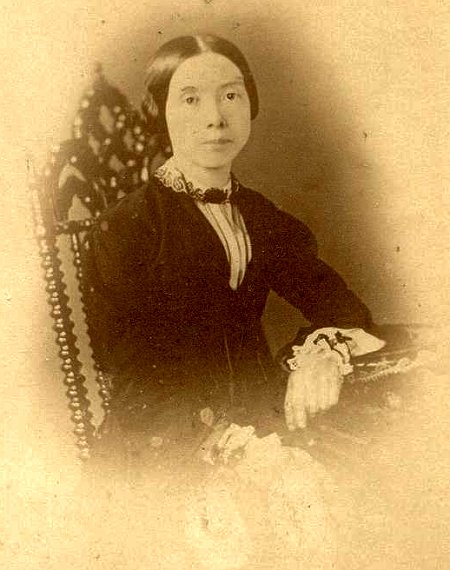
E m i l y D i c k i n s o n
(1830-1886)
This is my letter to the world
This is my letter to the world,
That never wrote to me, —
The simple news that Nature told,
With tender majesty.
Her message is committed
To hands I cannot see;
For love of her, sweet countrymen,
Judge tenderly of me!
I shall know why
I shall know why, when time is over,
And I have ceased to wonder why;
Christ will explain each separate anguish
In the fair schoolroom of the sky.
He will tell me what Peter promised,
And I, for wonder at his woe,
I shall forget the drop of anguish
That scalds me now, that scalds me now.
I never lost as much but twice
I never lost as much but twice,
And that was in the sod;
Twice have I stood a beggar
Before the door of God!
Angels, twice descending,
Reimbursed my store.
Burglar, banker, father,
I am poor once more!
Lost
I lost a world the other day.
Has anybody found?
You’ll know it by the row of stars
Around its forehead bound.
A rich man might not notice it;
Yet to my frugal eye
Of more esteem than ducats.
Oh, find it, sir, for me!

Emily Dickinson poetry
kempis poetry magazine
More in: Dickinson, Emily
.jpg)
J a n G i e l k e n s
E e n M e i v a n M e l l e
‘Jô – ik kan toch zó prachtig schilderen, hè.’
Herman Gorter vond dat de bundels met zijn eigen gedichten simpel en dus mooi moesten zijn. Zolang hij er het toezicht op had waren ze dat. Alleen de eerste druk van Mei in 1889 had een traditionele negentiende-eeuwse band met een bloemversiering. Vanaf Verzen, dat een jaar later verscheen, hadden Gorters boeken bruinrode of rode linnen banden of crèmekleurige papieren omslagen.
Saai, zal menigeen denken, en er komen dan ook exemplaren voor waaraan een bezitter heeft zitten knutselen. Zo bezit ik een zesde druk van Mei uit 1921, die van zichzelf in rood linnen gebonden is, met daarop subtiele zwarte strepen. Maar iemand heeft stroken zwart papier over de goudstempeltjes met auteursnaam en titel op de rug geplakt en bovendien zowel over het voor- als het achterplat nog eens net zulke stroken papier in de vorm van kruizen, en wel zo dat titel van het boek (er staat geen auteursnaam op het voorplat) verborgen blijft. Waarom? Wellicht is het na 1927 gedaan ter herinnering aan de toen overleden dichter? Of gebeurde het tijdens de Duitse bezetting om een boek van een bekende socialist onherkenbaar te maken?
.jpg)
Bijzonder is het exemplaar van de achtste druk van Mei uit 1940, dat ik voor weinig geld kocht bij een handelaar op de wekelijkse Haagse boekenmarkt. Het is er een met een crèmekleurig omslag, zoals die bij een aantal drukken naast de roodlinnen exemplaren verschenen. Op het voorplat staat een tekening. De handelaar dacht misschien wel: Gorter is toch al geen auteur om geld mee te verdienen, en dan een zoveelste druk, en iemand heeft dit exemplaar bovendien verpest met gedoedel, het moet dus maar op de tafel met de goedkope boeken.
Ik kocht het boek vanwege de curiositeit, zonder te weten wat het precies was, zoals ik ook dat exemplaar met de kruizen had gekocht. Wát het was stond op een briefje dat in het boek lag en dat al snel na de aankoop te voorschijn kwam: de doedel op het voorplat is een originele pentekening van de surrealistische tekenaar en schilder Melle Oldeboerrigter (1908-1976). Het is een landschapje. Misschien is het wel een illustratie bij Mei-regels als deze: ‘als in een droom / Schijnt hoog gegroeid riet heen en weer te wiegen / Met schaarse starren barnend als vuurvliegen.’ De Melle-kenners laten bij navraag weten dat ze dit soort praktijken van de kunstenaar niet kennen.
Waar komt dit boek vandaan? Er zit een exlibris op het schutblad, en dat is van de Amsterdamse arts en boekenverzamelaar Bob Luza, die in 1980 overleed en wiens bibliotheek in 1981 bij Van Gendt werd geveild. Maar in de catalogus van deze veiling komt deze Gorter niet voor.
Er zit nog iets in het boek: een krantenknipsel met de Kronkel ‘Vaarwel’ uit Het Parool van 28 mei 1976, vier dagen na het overlijden van Melle. Simon Carmiggelt vertelt over enkele ontmoetingen met de kunstenaar. Tijdens een van die ontmoetingen zei Melle volgens Carmiggelt: ‘Jô – ik kan toch zó prachtig schilderen, hè.’ En Carmiggelt antwoordde terecht: ‘Vind ik ook’.
Eerder gepubliceerd op: www.teksteditie.org
k e m p i s p o e t r y m a g a z i n e
More in: - Book Stories, Gorter, Herman, Jan Gielkens
.jpg)
A l f o n s i n a S t o r n i
(1892-1938)
Tu me quieres blanca
Tú me quieres alba,
Me quieres de espumas,
Me quieres de nácar.
Que sea azucena
Sobre todas, casta.
De perfume tenue.
Corola cerrada
Ni un rayo de luna
Filtrado me haya.
Ni una margarita
Se diga mi hermana.
Tú me quieres nívea,
Tú me quieres blanca,
Tú me quieres alba.
Tú que hubiste todas
Las copas a mano,
De frutos y mieles
Los labios morados.
Tú que en el banquete
Cubierto de pámpanos
Dejaste las carnes
Festejando a Baco.
Tú que en los jardines
Negros del Engaño
Vestido de rojo
Corriste al Estrago.
Tú que el esqueleto
Conservas intacto
No sé todavía
Por cuáles milagros,
Me pretendes blanca
(Dios te lo perdone),
Me pretendes casta
(Dios te lo perdone),
¡Me pretendes alba!
Huye hacia los bosques,
Vete a la montaña;
Límpiate la boca;
Vive en las cabañas;
Toca con las manos
La tierra mojada;
Alimenta el cuerpo
Con raíz amarga;
Bebe de las rocas;
Duerme sobre escarcha;
Renueva tejidos
Con salitre y agua;
Habla con los pájaros
Y lévate al alba.
Y cuando las carnes
Te sean tornadas,
Y cuando hayas puesto
En ellas el alma
Que por las alcobas
Se quedó enredada,
Entonces, buen hombre,
Preténdeme blanca,
Preténdeme nívea,
Preténdeme casta.
![]()
Alfonsina Storni poetry
fleursdumal.nl magazine
More in: Archive S-T, Storni, Alfonsina
.jpg)
P. A. d e G é n e s t e t
(1829 – 1861)
Matth. VI: 16.
Niet voor de Menschen
I
Voor de menschen klaag uw leed
Niet te luide, niet te lange,
Niet te bange:
Meest vertooning scheurt haar kleed.
Pronk niet met geleden smarte;
Eenvoud voegt het rouwend harte;
Stilte is tolk van ’t diep gemoed,
Meer dan wanhoops tranenvloed.
De eedle ziel, bij ’t heilig lijden,
Heeft haar fierheid ; vreest der schaar
Oppervlakkig treurgebaar,
Als den troost der ongewijden;
Wat voor allen, niet voor háár!
Moge een traan het oog ontgljden,
Echte droefheid, bleek maar schoon,
Draagt heur wonden niet ten toon.
Doch de nachtwaak ziet haar strijden,
Doch háár Trooster kent haar rouw,
En die zij beweent haar trouw!
II
Kunt gij ’t overvloeiend hart
Niet beheerschen? ’t Juk der smart,
’t Heilig kruis niet stille dragen?
Móet ge luide uw jammer klagen,
Handenwringen, waarom vragen?
Uitkomst zoeken in geween?
Ga, beproefde,
Zielsbedroefde,
Gij óók – in den hof, alléén!
Niet voor állen slaak uw klachte;
Voor den Kenner der gedachte,
Voor den Hoorder der gebeên,
Stort uw ziele uit, klaag en ween!
Ween en – bid t en ’s Heeren vrede,
– Engel, die vertroostend lacht –
Licht en kracht,
Op uw tranen, op uw bede,
Zullen dalen in uw nacht,
Straks, ô gij van God verkwikte!
„Zalf uw hoofd” en beur ’t omhoog,
Wisch de tranen uit het oog,
Dat den Hemel tegenblikte!
Toon ons geen mismaakt gelaat;
Laat óns in uw kalme trekken,
Van de rouw die niet vergaat,
Dieper ’t echte spoor ontdekken t
Eenvoud, waarheid in de smart,
Tuige ons de adel van uw hart.
.jpg)
P.A. de Génestet gedichten
k e m p i s p o e t r y m a g a z i n e
More in: Génestet, P.A. de
.jpg)
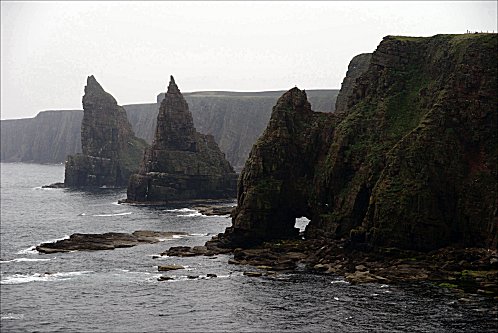
Rudyard Kipling
(1865-1936)
The White Seal
Oh! hush thee, my baby, the night is behind us,
And black are the waters that sparkled so green.
The moon, o’er the combers, looks downward to find us
At rest in the hollows that rustle between.
Where billow meets billow, there soft be thy pillow;
Ah, weary wee flipperling, curl at thy ease!
The storm shall not wake thee, nor shark overtake thee,
Asleep in the arms of the slow-swinging seas.
You mustn’t swim till you’re six weeks old,
Or your head will be sunk by your heels;
And summer gales and Killer Whales
Are bad for baby seals.
Are bad for baby seals, dear rat,
As bad as bad can be.
But splash and grow strong,
And you can’t be wrong,
Child of the Open Sea!
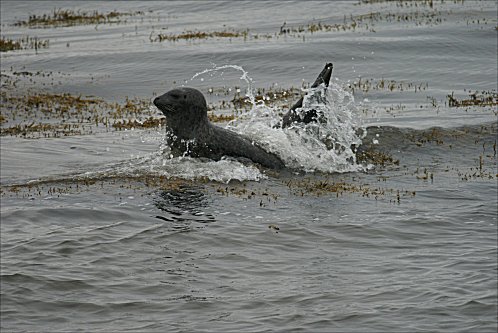
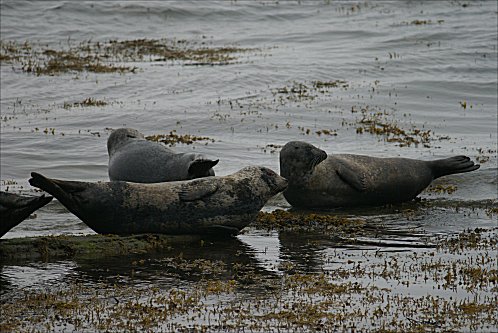
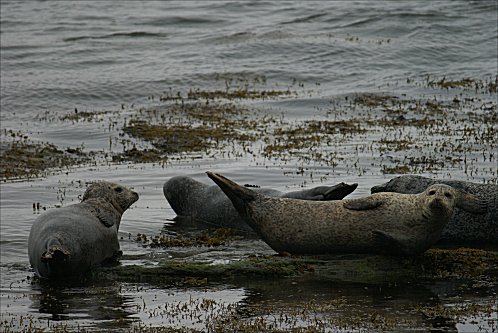
Hans Hermans Natuurdagboek – January 2010
Poem: Rudyard Kipling
Photos: Hans Hermans
fleursdumal.nl magazine
More in: Archive K-L, Archive K-L, Hans Hermans Photos, Kipling, Rudyard, MUSEUM OF NATURAL HISTORY - department of ravens & crows, birds of prey, riding a zebra, spring, summer, autumn, winter
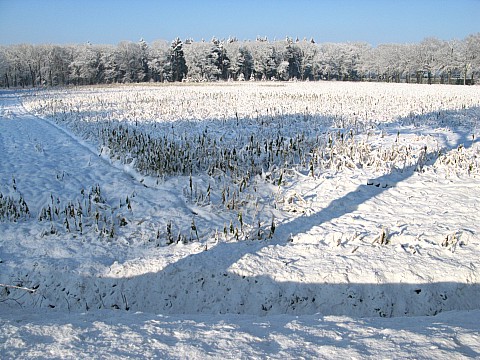

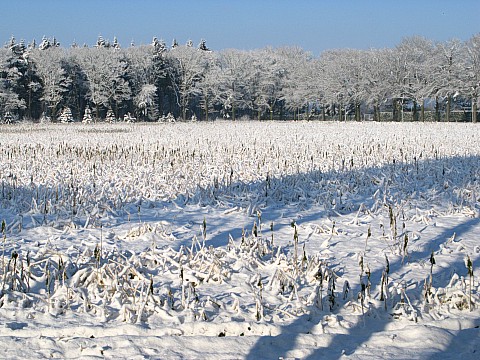
.jpg)

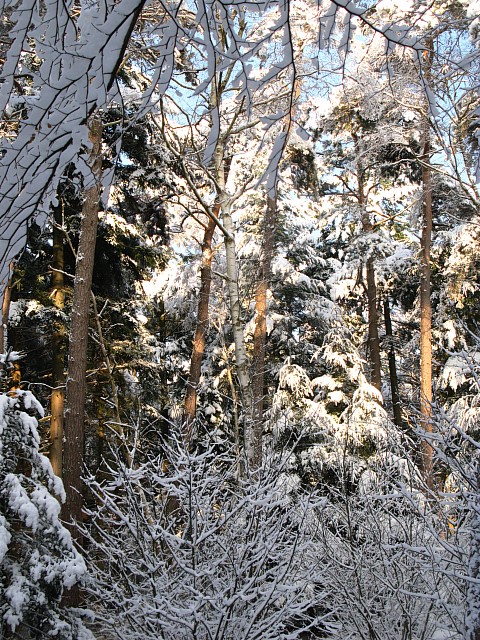
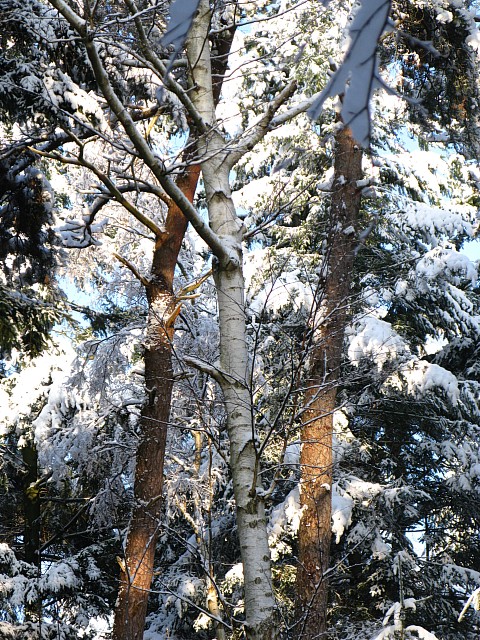
Henry Wadsworth Longfellow
(1807-1882)
The Cross of Snow
IIn the long, sleepless watches of the night,
A gentle face — the face of one long dead —
Looks at me from the wall, where round its head
The night-lamp casts a halo of pale light.
Here in this room she died; and soul more white
Never through martyrdom of fire was led
To its repose; nor can in books be read
The legend of a life more benedight.
There is a mountain in the distant West
That, sun-defying, in its deep ravines
Displays a cross of snow upon its side.
Such is the cross I wear upon my breast
These eighteen years, through all the changingscenes
And seasons, changeless since the day she died.
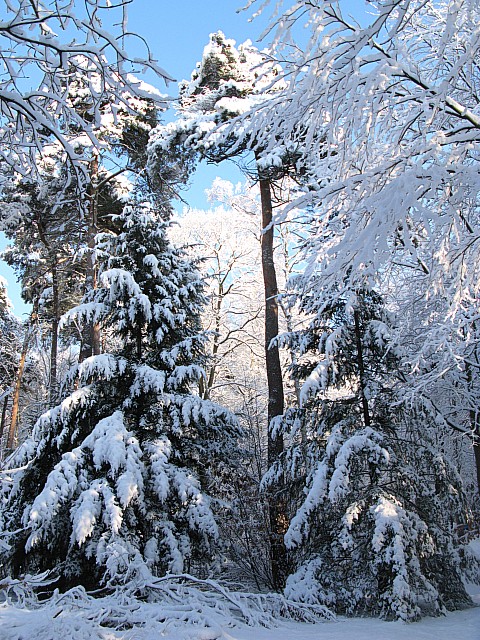
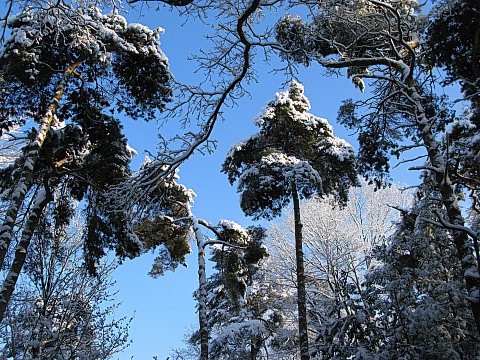
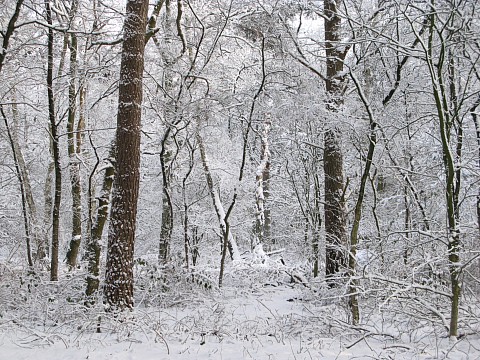
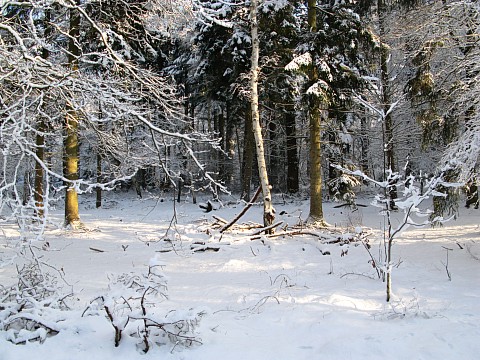
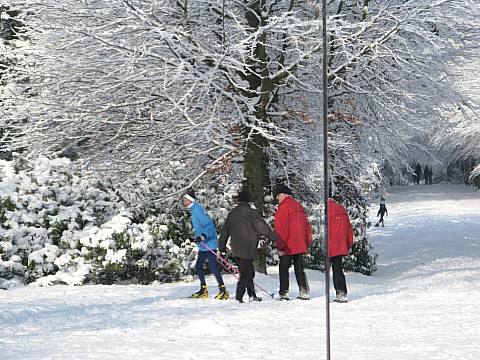

Winter 2010
Photos: Ton van kempen
Poem: H.W. Longfellow
fleursdumal.nl poetry magazine
More in: 4SEASONS#Winter, Dutch Landscapes, Longfellow, Henry Wadsworth, Ton van Kempen Photos
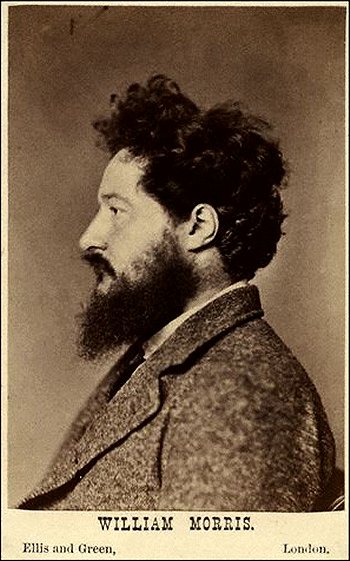
W i l l i a m M o r r i s
(1834-1896)
Mother and Son
Now sleeps the land of houses,
and dead night holds the street,
And there thou liest, my baby,
and sleepest soft and sweet;
My man is away for awhile,
but safe and alone we lie,
And none heareth thy breath but thy mother,
and the moon looking down from the sky
On the weary waste of the town,
as it looked on the grass-edged road
Still warm with yesterday’s sun,
when I left my old abode;
Hand in hand with my love,
that night of all nights in the year;
When the river of love o’erflowed
and drowned all doubt and fear,
And we two were alone in the world,
and once if never again,
We knew of the secret of earth
and the tale of its labour and pain.
Lo amidst London I lift thee,
and how little and light thou art,
And thou without hope or fear
thou fear and hope of my heart!
Lo here thy body beginning,
O son, and thy soul and thy life;
But how will it be if thou livest,
and enterest into the strife,
And in love we dwell together
when the man is grown in thee,
When thy sweet speech I shall hearken,
and yet ‘twixt thee and me
Shall rise that wall of distance,
that round each one doth grow,
And maketh it hard and bitter
each other’s thought to know.
Now, therefore, while yet thou art little
and hast no thought of thine own,
I will tell thee a word of the world;
of the hope whence thou hast grown;
Of the love that once begat thee,
of the sorrow that hath made
Thy little heart of hunger,
and thy hands on my bosom laid.
Then mayst thou remember hereafter,
as whiles when people say
All this hath happened before
in the life of another day;
So mayst thou dimly remember
this tale of thy mother’s voice,
As oft in the calm of dawning
I have heard the birds rejoice,
As oft I have heard the storm-wind
go moaning through the wood;
And I knew that earth was speaking,
and the mother’s voice was good.
Now, to thee alone will I tell it
that thy mother’s body is fair,
In the guise of the country maidens
Who play with the sun and the air;
Who have stood in the row of the reapers
in the August afternoon,
Who have sat by the frozen water
in the high day of the moon,
When the lights of the Christmas feasting
were dead in the house on the hill,
And the wild geese gone to the salt-marsh
had left the winter still.
Yea, I am fair, my firstling;
if thou couldst but remember me!
The hair that thy small hand clutcheth
is a goodly sight to see;
I am true, but my face is a snare;
soft and deep are my eyes,
And they seem for men’s beguiling
fulfilled with the dreams of the wise.
Kind are my lips, and they look
as though my soul had learned
Deep things I have never heard of,
my face and my hands are burned
By the lovely sun of the acres;
three months of London town
And thy birth-bed have bleached them indeed,
"But lo, where the edge of the gown"
(So said thy father) "is parting
the wrist that is white as the curd
From the brown of the hand that I love,
bright as the wing of a bird."
Such is thy mother, O firstling,
yet strong as the maidens of old,
Whose spears and whose swords were the warders
of homestead, of field and of fold.
Oft were my feet on the highway,
often they wearied the grass;
From dusk unto dusk of the summer
three times in a week would I pass
To the downs from the house on the river
through the waves of the blossoming corn.
Fair then I lay down in the even,
and fresh I arose on the morn,
And scarce in the noon was I weary.
Ah, son, in the days of thy strife,
If thy soul could but harbour a dream
of the blossom of my life!
It would be as the sunlit meadows
beheld from a tossing sea,
And thy soul should look on a vision
of the peace that is to be.
Yet, yet the tears on my cheek!
and what is this doth move
My heart to thy heart, beloved,
save the flood of yearning love?
For fair and fierce is thy father,
and soft and strange are his eyes
That look on the days that shall be
with the hope of the brave and the wise.
It was many a day that we laughed,
as over the meadows we walked,
And many a day I hearkened
and the pictures came as he talked;
It was many a day that we longed,
and we lingered late at eve
Ere speech from speech was sundered,
and my hand his hand could leave.
Then I wept when I was alone,
and I longed till the daylight came;
And down the stairs I stole,
and there was our housekeeping dame
(No mother of me, the foundling)
kindling the fire betimes
Ere the haymaking folk went forth
to the meadows down by the limes;
All things I saw at a glance;
the quickening fire-tongues leapt
Through the crackling heap of sticks,
and the sweet smoke up from it crept,
And close to the very hearth
the low sun flooded the floor,
And the cat and her kittens played
in the sun by the open door.
The garden was fair in the morning,
and there in the road he stood
Beyond the crimson daisies
and the bush of southernwood.
Then side by side together
through the grey-walled place we went,
And O the fear departed,
and the rest and sweet content!
Son, sorrow and wisdom he taught me,
and sore I grieved and learned
As we twain grew into one;
and the heart within me burned
With the very hopes of his heart.
Ah, son, it is piteous,
But never again in my life
shall I dare to speak to thee thus;
So may these lonely words
about thee creep and cling,
These words of the lonely night
in the days of our wayfaring.
Many a child of woman
to-night is born in the town,
The desert of folly and wrong;
and of what and whence are they grown?
Many and many an one
of wont and use is born;
For a husband is taken to bed
as a hat or a ribbon is worn.
Prudence begets her thousands;
"good is a housekeeper’s life,
So shall I sell my body
that I may be matron and wife."
"And I shall endure foul wedlock
and bear the children of need."
Some are there born of hate,
many the children of greed.
"I, I too can be wedded,
though thou my love hast got."
"I am fair and hard of heart,
and riches shall be my lot."
And all these are the good and the happy,
on whom the world dawns fair.
O son, when wilt thou learn
of those that are born of despair,
As the fabled mud of the Nile
that quickens under the sun
With a growth of creeping things,
half dead when just begun?
E’en such is the care of Nature
that man should never die,
Though she breed of the fools of the earth,
and the dregs of the city sty.
But thou, O son, O son,
of very love wert born,
When our hope fulfilled bred hope,
and fear was a folly outworn.
On the eve of the toil and the battle
all sorrow and grief we weighed,
We hoped and we were not ashamed,
we knew and we were not afraid.
Now waneth the night and the moon;
ah, son, it is piteous
That never again in my life
shall I dare to speak to thee thus.
But sure from the wise and the simple
shall the mighty come to birth;
And fair were my fate, beloved,
if I be yet on the earth
When the world is awaken at last,
and from mouth to mouth they tell
Of thy love and thy deeds and thy valour,
and thy hope that nought can quell.
.jpg)
William Morris poetry
kempis poetry magazine
More in: Morris, William
.jpg)
A n n e B r o n t ë
(1820-1849)
Past Days
‘Tis strange to think there WAS a time
When mirth was not an empty name,
When laughter really cheered the heart,
And frequent smiles unbidden came,
And tears of grief would only flow
In sympathy for others’ woe;
When speech expressed the inward thought,
And heart to kindred heart was bare,
And summer days were far too short
For all the pleasures crowded there;
And silence, solitude, and rest,
Now welcome to the weary breast–
Were all unprized, uncourted then–
And all the joy one spirit showed,
The other deeply felt again;
And friendship like a river flowed,
Constant and strong its silent course,
For nought withstood its gentle force:
When night, the holy time of peace,
Was dreaded as the parting hour;
When speech and mirth at once must cease,
And silence must resume her power;
Though ever free from pains and woes,
She only brought us calm repose.
And when the blessed dawn again
Brought daylight to the blushing skies,
We woke, and not RELUCTANT then,
To joyless LABOUR did we rise;
But full of hope, and glad and gay,
We welcomed the returning day.
![]()
Acton Bell (Anne Brontë) poetry
fleursdumal.nl magazine
More in: Anne, Emily & Charlotte Brontë, Archive A-B, Brontë, Anne, Emily & Charlotte
.jpg)
W i l l i a m S h a k e s p e a r e
(1564-1616)
T H E S O N N E T S
20
A woman’s face with nature’s own hand painted,
Hast thou the master mistress of my passion,
A woman’s gentle heart but not acquainted
With shifting change as is false women’s fashion,
An eye more bright than theirs, less false in rolling:
Gilding the object whereupon it gazeth,
A man in hue all hues in his controlling,
Which steals men’s eyes and women’s souls amazeth.
And for a woman wert thou first created,
Till nature as she wrought thee fell a-doting,
And by addition me of thee defeated,
By adding one thing to my purpose nothing.
But since she pricked thee out for women’s pleasure,
Mine be thy love and thy love’s use their treasure.
![]()
k e m p i s p o et r y m a g a z i n e
More in: -Shakespeare Sonnets
Thank you for reading Fleurs du Mal - magazine for art & literature